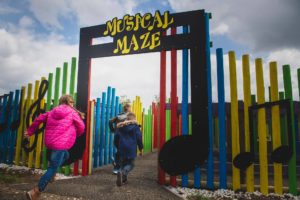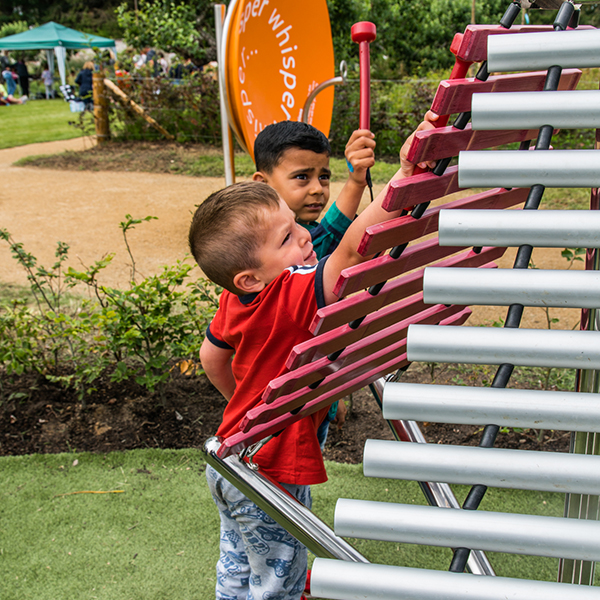Audiences Reap the Rewards of Outdoor Music
Percussion Play explores how outdoor musical play can transform audience wellbeing and improve experiences for all
As we near the second anniversary of the start of the Covid-19 pandemic, museums and heritage sites will be reflecting on what they have learnt from having to adapt and change the way they interact and open to the public. From reducing capacity and implementing booking systems, to embracing their outdoor space, we have seen attractions across the world pivot in order to stay open.
Museums and heritage sites based mainly in the outdoors have had opportunities to embrace outdoor learning and engagement during the past two years, and many have adapted to include much more than simply outdoor playgrounds. One such site where there’s a variety of outdoor activities is the National Forest Adventure Farm, based in Staffordshire. With traditional animal experiences and tractor rides, the farm has also embraced outdoor musical instruments.
At the farm, children can explore the interactive and accessible ‘musical maze’ navigating through the maze to discover the six hidden musical instruments one at a time.
Asked why they chose to create a musical maze, Ivor Robinson, who runs the farm with his brother, Tom, says, “as part of continual investment in the Adventure Farm, we wanted to add a new activity to our outdoor play area that improved the visitor experience. It was important to create a unique attraction that was accessible to children (and adults) of all ages and abilities.”
The farm ordered instruments from Percussion Play including their Trio Ensemble comprised of Large Babel Drum, Rainbow Sambas and Tubular Bells. They topped this up with a Duo Cupla, Akadinda and Freechimes Pentatonic Symphony. “We chose a range of instruments that created different sounds and were made of different materials to add variety to the Musical Maze experience.”
Ivor says, “Feedback has been fantastic with families telling us how much they enjoyed the maze with their children. It has also inspired families to visit the Adventure Farm to come and try them out!”.
Having instruments in outdoor settings is not only beneficial during a pandemic but it can open up a new world for children who are disabled or have learning disabilities. Children who find it difficult to learn inside a classroom can benefit from learning in the great outdoors and due to the instruments being set in accessible open space, this means there are no limits for children with limited movement.
Studies suggest that playing musical instruments can lead to improved communication skills and has been proven to be particularly beneficial for those on the autistic spectrum. Music can provide individuals with the means of self-expression which is sometimes missing if verbal communication is difficult or limited. When individuals who struggle with verbal communication are supported to communicate non-verbally by playing music with others, there is often evidence that their verbal communication improves as a result.
Indeed, making music outside has benefits for all children, importantly ensuring they spend time outdoors encouraging physical exercise. Playing outdoor musical instruments enables children to improve their gross motor skills because they are encouraged to use full-body movements as they jump, dance, and run from one instrument to another.
When playing larger instruments there is a positive impact on core stability. The right side of our brain controls the muscles on the left side of our bodies and the left side of the brain controls the muscles on the right side of our bodies. When we cross our midline with our arms or legs, we boost communication between the two hemispheres of our brains. For children to become confident with movements that cross the midline, we need to encourage the brain’s two hemispheres to work together.
Playing outdoor musical instruments also encourages the use of fine motor skills and improves hand-eye coordination as the child must hold a beater or mallet and hit the instrument in a specific place to make a sound.
For these reasons playing musical instruments, particularly ones in an outdoor setting, can lead to very positive physical health benefits.
 Visitors to Brodie Castle have been able to benefit from outdoor musical instruments. Cared for by the National Trust for Scotland (NTS), Brodie Castle is a 16th-century rose-coloured, turreted castle that was the ancestral home of the Brodie clan for over 400 years. Visitors to the 71-hectare estate can enjoy the beautifully landscaped garden, nature trail and The Playful Garden: a magical garden experience for all the family to enjoy and home to a fascinating menagerie of characters inspired by the castle’s colourful history.
Visitors to Brodie Castle have been able to benefit from outdoor musical instruments. Cared for by the National Trust for Scotland (NTS), Brodie Castle is a 16th-century rose-coloured, turreted castle that was the ancestral home of the Brodie clan for over 400 years. Visitors to the 71-hectare estate can enjoy the beautifully landscaped garden, nature trail and The Playful Garden: a magical garden experience for all the family to enjoy and home to a fascinating menagerie of characters inspired by the castle’s colourful history.
Inspired by the stories of the castle and the Brodie family, the garden, its quirky characters and areas for play, performance, and discovery is attracting visitors of all ages. There are unicorns, orang-utans and toads to meet, as well as a mini-Brodie Castle to clamber on. The twinkling sounds of outdoor drums, musical chimes and xylophones ring out over the garden, creating a special atmosphere.
It’s important to recognise that it’s not just children who can benefit from creating music in the great outdoors. Adults, including people living with Alzheimer’s, can enjoy the opportunity to create music and enjoy the mental and physical benefits. Recent research from Percussion Play shows that music can be a highly efficient therapeutic tool particularly in terms of stimulating musical memory, facilitating emotional regulation, and managing anxiety levels.
Music crosses all sorts of imposed cultural, linguistic, generational, and gendered boundaries, and serves as a space for developing connections between all people, across various lines of difference. This is a widely cited and well known argument for music’s ability to facilitate connection. However, even within our own brains — of which music activates and wakes up both the left and the right-hand sides — musical engagement has the ability to forge its own internal connections: creating new neural pathways and lines of communication inside the brain.
Music is increasingly used as a tool to encourage this neuroplastic ‘rewiring’ of the brain by music therapists and researchers in various fields including Alzheimer’s disease and dementia.
Music also has the ability to connect audiences to locations, creating an atmosphere and helping to immerse visitors in their experience. At Brodie Castle the musical instruments in The Playful Garden enable audiences to enter ‘a new world’ where they can come across a menagerie of characters that help to tell the history of the castle and its family.
As we look ahead to this year, it’s no surprise then that the great outdoors will most probably continue to be embraced by museums and heritage sites as, post-pandemic, the world moves to socialising and playing outside. Visitor attractions here in the UK have a renewed appreciation for their outdoor spaces and are realising they can bring much more to their outside space, including the sound of music.
About Percussion Play:
Percussion Play is the world-leading manufacturer of outdoor musical instruments. With a diverse selection of musical and percussion instruments, they are committed to making musical expression accessible to everyone, everywhere.
Specifically designed for challenging outdoor environments including; playgrounds, parks and museums, the instruments are fully inclusive, accessible and enjoyed by all.
Twitter: @percussionplays
Instagram: @percussionplay
